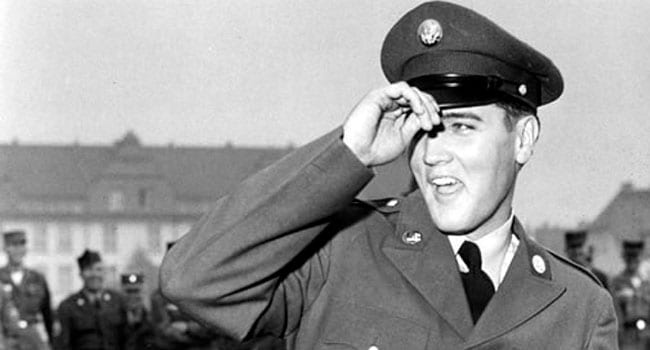 Elvis Presley was no more immune to the draft than other young American men of his era. Having reached eligible age, he was medically examined, declared physically fit and duly called up.
Elvis Presley was no more immune to the draft than other young American men of his era. Having reached eligible age, he was medically examined, declared physically fit and duly called up.
Apart from his training period, his entire two-year army stint was spent in what was then West Germany.
And the lead up to his March 1958 induction was a major international news story. While his fans were deeply upset, lots of adults were secretly pleased. To them, Elvis was a bad influence on the morals of his young audience.
But the army would cut his hair, shave his sideburns and remove him from the scene for a couple of years. Hopefully, those adults reasoned, he’d be a forgotten figure by the time his military service was over. Rock ’n’ roll, after all, was just a passing phase and Elvis was no more than a freakish curiosity.
However, he was also a thriving business – not just for himself but for the various corporate entities associated with him.
RCA, the company that released his records, had a special interest and attempted to protect it by stockpiling material for release during his absence. It was a strategy that generally worked well, although the cupboard was bare by the summer of 1959.
So there was considerable speculation when March 1960 rolled around. With Elvis about to be honourably discharged, how would he fit into a popular music environment that had changed during his absence?
In North America, the brash New Yorker Bobby Darin had jumped ship from rock ’n’ roll to make 1959’s biggest hit. Mack the Knife was a finger-snapping, jazzy revival of a song dating to 1928. It was the sort of thing you’d associate with the likes of Frank Sinatra rather than Elvis. And many pundits pronounced it the way of the future.
The first rock ’n’ roll Christmas by Pat Murphy
Meanwhile across the Atlantic, the young Cliff Richard serendipitously discovered that expanding his repertoire beyond Elvis-type material could double his market. If you softened the beat a little and put extra emphasis on catchy, positive things happened at the cash register.
As part of his public reintroduction, Elvis made a guest appearance on one of Sinatra’s Timex TV specials.
There was a touch of irony in this, Sinatra having expressed a loathing for rock ’n’ roll and its practitioners. The genre was, he said, “the most brutal, ugly, degenerate, vicious form of expression.” And it was mostly performed by “cretinous goons.”
It’s tempting to see the Elvis guest spot as a form of rapprochement between musical generations. Sinatra, though, hadn’t changed his mind.
But he needed ratings.
Notwithstanding his triumphs in other entertainment mediums, Sinatra had struggled to find a television audience commensurate with his overall star stature. It was as if his edgy, wise-guy personality wasn’t quite the thing people wanted to welcome into their living room.
Elvis, therefore, was useful. The novelty of his first return appearance would surely boost the viewer numbers. People would be curious.
And Elvis in the flesh was different from what he’d been before.
It went beyond being shorn of the sideburns.
Two years older, Elvis had filled out and the lean and hungry louche look was gone. He cut an impressive figure, showing no indication of the weight problems that were to plague him a decade or so later.
Then there was the music.
When asked about it, Elvis initially discounted any suggestion of an impending radical change. Still, although rock ’n’ roll wasn’t abandoned, the changes were substantial.
Recorded in April and released in early July, It’s Now or Never was based on the 1898 Neapolitan melody O Sole Mio. It had a lilting tune and a dramatic – almost operatic – ending. It was hugely different from anything he’d done before and became the most successful recording he ever made.
He went back to the Neapolitan well several months later with Surrender, a soaring adaptation of 1902’s Torna a Surriento. And in between, there was a smash hit revival of a ballad from 1926 called Are You Lonesome Tonight?
Nor was it just a matter of material or style. The voice, too, had changed. While still instantly recognizable, it was smoother and more rounded.
Not everyone approved. Some felt the army had domesticated him and pined for the Elvis of yore.
Life, however, moves on. It’s always been like that.
Troy Media columnist Pat Murphy casts a history buff’s eye at the goings-on in our world. Never cynical – well perhaps a little bit.
The views, opinions and positions expressed by columnists and contributors are the author’s alone. They do not inherently or expressly reflect the views, opinions and/or positions of our publication.
